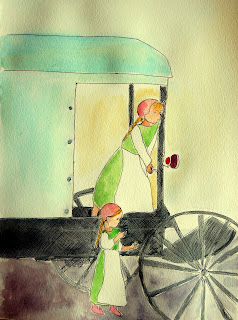My great aunt
Carme was like a mother to me, we grew up with her, she was our caregiver during the week and so we loved her very much. She used to work when she was very young at the ironing house, near the
Plaza del Pi, and she told us stories about how hot it was in the summer, to iron, and how many shirts, towels, linen, would be awaiting in the pile each day.
Our closets were very well organized, every dress, sock and underwear neatly ironed and properly folded away, and I remember admiring the beauty of that sight.
Now that I carry my own household, I long for those closets. My house is more or less well organized, but ah! if you look inside the closets you would see the mess there is...and I think this is because of the
will.
Now, do not get me wrong, I do not think that extreme neatness is beneficial, on the contrary, there is a balance to the health in the soul, mind and spirit, but in my case I see perfectly well that an
exercise of ironing would strenghten my will. It is the
penetration of the will in matter that is to be accomplished and through ironing even the most menial clothing, I am hoping to exert my will through material resistance.
Here are some quotes about the will in the book that I mentioned last week that illustrate this weakness of will prevalent in our times:
"
We do not know how to use the will, or rather we will into a vague and fugitive manner..............Now this is our great fault with resolutions: they are not specific enough.......your resolutions must take to be practical, and on this condition only will they be efficacious"
"Will with perseverance! Never abandon your resolutions because you were unsuccesful.......A person who is truly humble, instead of feeding on grief, rises at once and relying more on the mercy and goodness of God than on her own strength, takes up the march again. To learn to profit by our falls is one of the secrets of perfection, and an essential requisite of spiritual progress."
Now there are also
different intensities of the longing: starting with a
desire, then a
wish, then a
mission or
goal, an
aspiration, and when finally its gets to be a
resolution, our strenght is totally engaged in the object, and
help comes along.
In the
ironing chapter I wanted to commit myself to iron one day a week this summer, on Tuesdays. When the success comes with this simple task, I know
other areas will improve as well.
Saint John is a very special celebration in my country, we used to make bonfire on the
eve of Saint John, eat the Coca de San Joan, and bring old furniture to burn, representing the burning of the old, and making space for the new, allowing all our mistakes and wrong deeds of the year to be in front of us and make resolutions of improvement.
I will copy the recipe below if you want to try it, wishing
resolutions and blessings to come your way.
Prep Time: 1 hour, 45 minutes
Cook Time: 20 minutes
Total Time: 2 hours, 5 minutes
Yield: 1 coca serves 4-6
Ingredients:
- 4 cups unbleached white flour
- 1/2 cup milk
- 2 envelopes (1/4 oz each) dry yeast
- 2/3 cup water
- 2 eggs
- 1/2 cup granulated sugar
- 1/8 tsp salt
- rind or zest of 1 lemon
- 4 Tbsp unsalted butter
- 1/4 cup canola oil
- 1 egg white
- several types of candied fruit – oranges, cherries, etc.( we found papaya and pineapple)
- 3 Tbsp pine nuts, optional
Preparation:
Grease a cookie sheet and set aside.
Dissolve the yeast in lukewarm milk in a glass measuring cup. Melt butter.
Sift the flour into a large mixing bowl. Make a hole in the center of the flour. Add eggs, sugar, yeast-milk mixture, lemon zest, salt and cinnamon to the center of the flour. Stir slightly.
Add canola oil and melted butter to the bowl. Mix thoroughly, while adding water a bit at a time until a soft dough is formed. (The amount of water needed will depend on temperature and weather conditions.) Form a ball in the bowl. Cover the bowl with a towel and leave it in a warm place, out of drafts. Allow to rise until dough has doubled in size.
Heat oven to 350F degrees.
Turn the dough onto the greased cookie sheet. Sprinkle flour on the dough. Roll out the dough with a rolling pin to the form of a long oval, about 1/2-inch thick.
Lightly beat the egg white. Brush top of coca. Decorate with the candied fruit and sprinkle with granulated sugar.
Position a rack in the middle of the oven. Place the baking sheet in the oven for approximately 20 minutes or until coca turns a golden brown.






















